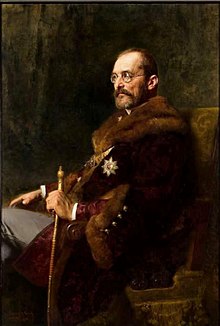István Tisza
|
Count István Tisza de Borosjenő et Szeged |
|
|---|---|
 |
|
| Prime Minister of the Kingdom of Hungary | |
|
In office 3 November 1903 – 18 June 1905 |
|
| Monarch | Francis Joseph I |
| Preceded by | Károly Khuen-Héderváry |
| Succeeded by | Géza Fejérváry |
|
In office 10 June 1913 – 15 June 1917 |
|
| Monarch | Francis Joseph I Charles IV |
| Preceded by | László Lukács |
| Succeeded by | Móric Esterházy |
| Personal details | |
| Born |
22 April 1861 Pest, Hungary |
| Died | 31 October 1918 (aged 57) Budapest, Hungary |
| Nationality | Hungarian |
| Political party |
Liberal Party National Party of Work |
| Religion | Calvinism |
Count István Tisza de Borosjenő et Szeged (archaically English: Stephen Tisza; 22 April 1861 – 31 October 1918) was a Hungarian politician, prime minister, political scientist and member of Hungarian Academy of Sciences. The prominent event in his life was Austria-Hungary's entry into the First World War when he was prime minister for the second time. He was later assassinated during the Chrysanthemum Revolution on 31 October 1918 - the same day that Hungary terminated its political union with Austria. Tisza supported the dual monarchy of Austria-Hungary and was representative of the then liberal-conservative consent.
He had been a Member of Parliament since 1887 and had had abundant opportunities to see how the unyielding temper of the Emperor on the one hand, and the revolutionary spirit of the extremists on the other, were leading to a complete impasse. He himself supported the Compromise of 1867. A social reactionary to the end, Tisza stubbornly opposed on principle the break-up of the large landed estates as well as even the most modest reform proposals that would have granted the suffrage to soldiers fighting at the front (before 1918 only 10% of the Hungarian population could vote and hold office). However, in economic affairs, he tended to be a modernizer who encouraged and supported industrialization and, in that respect, he was an opponent of anti-Semitism, which he feared could jeopardize Hungary's economic development.
Tisza's role model was Otto von Bismarck. As an economist he followed the concepts of English historical school of economics, as lawyer and political scientist, Tisza favored the societal and political development of England, which he considered as "ideal way of development".
István Tisza was the son of Kálmán Tisza de Borosjenő, prime minister of Hungary between 1875–1890 from the Liberal Party. The Tiszas were originally a Calvinist untitled lower nobility (regarded as equivalent to the British gentry). His mother was a southern German aristocrat Ilona Degenfeld-Schomburg, from Baden-Württemberg (born: Helene Johanna Josepha Mathilde Gräfin von Degenfeld-Schonburg).
...
Wikipedia
